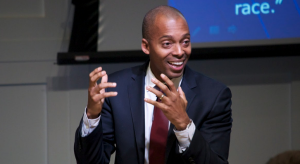By Talha Ahmed
Correspondent
Khalil Gibran Muhammad, the director of the Schomburg Center for Research in Black Culture of the New York Public Library, spoke at the College on Wednesday, Oct. 30 on “Race, Crime and Modern Urban America.”
“We live in a society where empirical, quantitative evidence is more ‘scientific’ than anecdotal, narrative evidence,” Muhammad said. “Statistics is the bread and butter of social science.”
Muhammad began his lecture with the spurring debate over the infamous stop-and-frisk policies deployed in New York City.
“About 87 percent of stop-and-frisks were of blacks and Latinos. 90 percent lead to nothing. Of the rest that do get processed, only .1 percent

get charged with any type of criminal activity,” Muhammad said. On Oct. 14, Judge Shira A. Scheindlin of Manhattan’s Federal District Court ruled the New York Police Department’s stop-and-frisk policy unconstitutional in the case of Floyd v. City of New York.
Muhammad touted parameters ranging from 1890 to 2013 as an example of how slow progress has been in the shift of the perception of blacks in America.
“All the negative connotations of being black remained,” Muhammad said. “There has not been a time in America where, according to public eye, black people’s tendency to commit crime has not affected black people’s civil rights. Things like where black people should live, how much they should be educated, what jobs they can do and whose daughters they can date.”
That was 1890. Yet in 2013, discrimination is still very common. In fact, the UF-250, the form that NYPD fills out to justify a stop-and-frisk, includes a checkbox that reads, “Wearing Clothes/Disguises Commonly Used in the Commission of Crime.”
The ambiguity of the parameters of suspicion disqualifies the likelihood of objectivity.
“The perception of blacks is much like the wiring of today’s building, technically speaking, in that it uses the same wiring techniques as were used when Thomas Edison illuminated the world,” Muhammad said, utilizing a strikingly accurate analogy to describe the antiquated mindset toward African Americans.
Ultimately, Muhammad urged for Americans to point their efforts toward more problematic issues. He called for a systematic reform that will illuminate the crimes that plague this country without the context of race.






